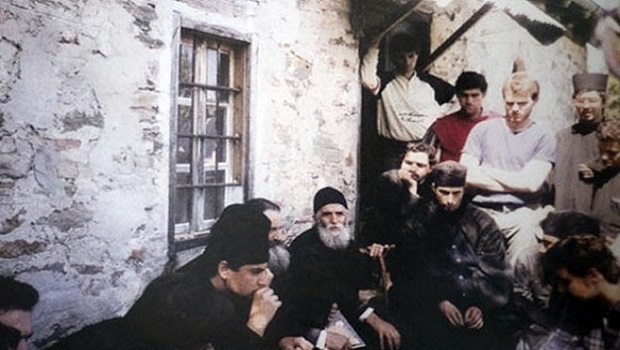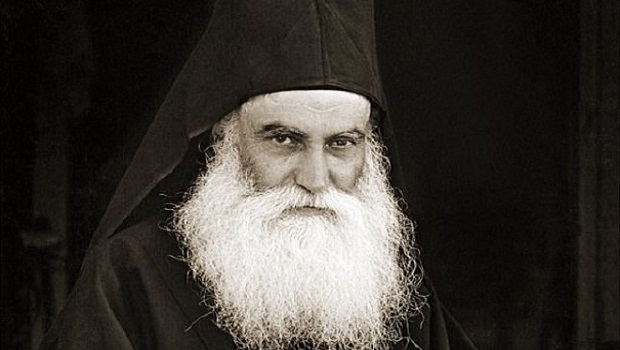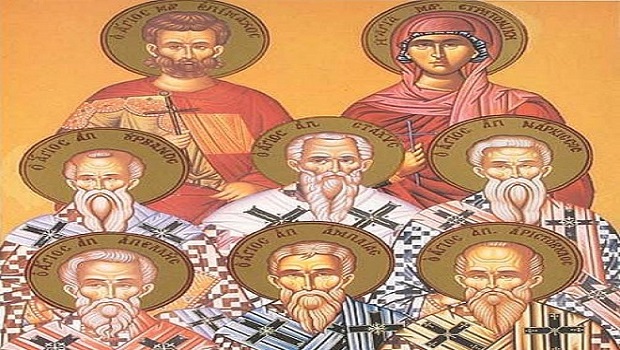Archimandrite Charalambos Vassilopoulos (†)
Saint Stylianos was born in Paphlagonia, Asia Minor, between 400 and 500. He was blessed even from his mother’s womb. As he grew up, by the grace of God he increasingly became a dwelling-place of the Holy Spirit. From childhood he displayed the rare qualities of his blessed life. When he was young and still an adolescent, although, of course, he was of the flesh, he never allowed desires to pollute his spirit and soul. He was very pure. Nor did he allow any earthly passion to dominate him. He would not permit riches and the love of wealth to permeate his soul and subject him to corruption and perdition.
With the power and grace of God, he fought against all the allurements of this blighted and fleeting life. He thought with the genuine wisdom of God and saw that this material world was transitory and worthless. He decided that henceforth he would walk where his soul led him. His soul called him to fine moral battles. It called him to the exercise of virtue. It showed him the difficult and bumpy road that leads to eternal life and everlasting happiness.
His pure and faithful heart obeyed the voice of his soul. His first act was to sell his belongings and give the proceeds to the poor of the Church. When nothing remained of his inheritance [sources disagree on whether this was large or next to nothing], he was greatly relieved and said “I have cast off a heavy anchor that was keeping me tied to the desires of this mortal flesh. I have discarded corruption and perdition. Now I see before me more plainly the road to real life”. Now relieved of his burden, and with a glad heart, because he had spent his wealth on the unfortunate poor and on other works pleasing to God, the saint considered how to live a more honourable and saintly life.
Owning nothing more than the clothes he stood up in, he began a harsh contest and struggle, in accordance with the teaching of Jesus Christ. So when, through his generosity, the blessed Stylianos had elevated his earthly wealth to the heavens and secured it there, he went to a monastery and adopted the monastic habit. From that moment on, no earthly thought, no material concern was able to wrest him from his faith and his prayers. He cared for nothing else and desired nothing but that which is pleasing to the holy will of God. He struggled to find ways in which to please the Lord, of how to perfect his soul and gain entry into Paradise. No desire of his which ran contrary to the will of God was harboured in his soul. The strict asceticism of his life is beyond description. His sanctity began to blaze forth. His humility shone brightly. His purity was blinding. His fasting most meticulous. His prayer true communion with God.
His vigils were amazing. He set himself three aims to achieve as a monk: poverty, chastity and obedience. And he achieved them all. We have already seen his poverty: he did not keep anything at all for himself, nor did he attempt to acquire anything for himself in life. He lived in poverty and complete penury.
He was scrupulous as regards his purity and morality. He kept his soul free “of every stain of the flesh and spirit”. He fought against the attacks of the spirit so that filthy sin would not touch him. His mind was continually turning over Christ’s words: “Blessed are the pure in heart, for they shall see God”. His obedience to his elder and the others in the monastery was exemplary. He worked hard to cut off his own will, since our will is grounded in egotism. This is a very difficult thing to do, as anyone knows who has attempted it. Saint Stylianos struggled mightily in the monastery against the three enemies: the flesh, the world and the devil. If you are to overcome these, it requires a long and constant struggle, harsh and ever-vigilant.
So Saint Stylianos proved to be a stalwart of the ascetic life. He became an example to young and old alike and was a model to be imitated. But the austerity of his ascetic life did not satisfy him and he wished to approach ever more closely to perfection. He now desired complete isolation and the strictest asceticism: that of a hermit. He bade farewell to his fellow monks in the monastery and retreated far off into the desert away from all habitation. There, in the desert, he lived in a cave.
The new phase of his ascetic life was aimed at celestial perfection. The days and nights went by with contemplation, thoughts, and prayers to the Triune God. With all his heart, he hymned God’s majesty, he sang praises to the Holy Trinity. He lived united to God Nothing disturbed his divine serenity.
Everything around him and whatever appeared on the far horizon were for him nothing but proof of the Creator. He studied God’s creation and this strengthened his faith even more.
There, in the peace of the desert, the hermit Stylianos had the time to observe God’s creation and meditate upon it. He saw the Creator in all things, because he reasoned that it was impossible for this wonderful world to have come about by itself, given that it is so beautiful, intentional and harmonious. He saw God in the infinite number of stars in the sky, which whirl through vast space at such speed and with such accuracy.
He saw all this and raised his voice as David had done before him: “The heavens declare the glory of God, and the firmament proclaims the work of His hands”. Then he would break into a doxology: “How magnificent are Your works, Lord”. You have made everything in wisdom. The earth has been filled with Your creation”.
He read and re-read two books in the desert: the book of nature and that of Holy Scripture. His heart, his understanding, his soul, his whole being was fervently given over to God. A divine and sacred trembling would pass through his ascetic flesh, as his soul delved ever deeper into the beauty of the divine creation. The holy passion of Saint Stylianos’ love for the most holy Name of God shook him to the core. The whole of his strength was concentrated on this divine love. And so the saint abandoned his fleshly existence. He ceased to care at all about food and nourished himself on desert plants. When there were none of these, God did not leave him in want. God, Who works wonders for His saints, for them and through them, did not allow the blessed man to fade away from hunger. He kept him alive by sending him food at the hands of angels, as He had done with the Prophet Elijah and Saint Mark the Athenian, the philosopher, among others.
He lived the hard life of a hermit for many years, for decades contending with the devil and his own self. He fought to uproot his passions, to acquire virtues and to reach the saintliness that God wants, the God Who said: “Become holy for I am holy”.
The Creator wanted Saint Stylianos to continue living, wanted his virtue to shine and wanted him to be a model for others with the austerity of his ascetic life. He wanted this animate pillar of abstinence, the bright light of the desert, to shine throughout the world. God wanted his virtues to manifest themselves. But a lamp needs to be set on high, not to be hidden under a bushel. So when certain people are radiant through their virtues, God manifests them so that they can light the way of others on the road.
Thus, once Saint Stylianos had been adorned with virtues and was like a candle flaming with warm, sweet light, once he had reached the heights of virtue hard even to envision, he was able to transmit to people the gladsome light of his sanctity, for the glory of God and the salvation of other people. God, Who is just, would again demonstrate to people how He returns glory to those who worship His name and glorify Him.
So the fame of Saint Stylianos spread everywhere. A host of people gathered from all around to wonder at his sanctity and derive spiritual and bodily benefits from him. His saintly figure, his words of wisdom, his exhortations, changed the lives of many people. There were many who, enthused by his asceticism, abandoned their wicked past, repented and became reborn spiritually. The accounts from Christians who visited him in the desert, where his hermitage was, are very moving. He knew how to calm troubled souls. Other ascetics came to join him, in order to be strengthened in their struggle by his words and radiance. Saint Stylianos knew that, for people to be saved, they needed to have their souls like those of little children, who are innocent. He recognized that children are little angels, which is why he wished to help them and protect them. And God, Who works miracles, granted Stylianos grace in this matter, too.
God rewarded his blessed intent and gave him the wonder-working power to cure ailing children. Mothers from near and far, hastened to him, in pain and faith, bearing sick and crippled children on their shoulders, seeking a cure for their offspring. Some walked for days on end in the wilderness to find the hermit’s cave. When they arrived, they fell at his feet with tears in their eyes, glorifying God that they had finally found the saint and asking him to cure their children. Full of kindness and compassion, Stylianos would take the sick infants into his arms and, with tears in his eyes, beg God to cure them. The Lord of the Heavens would listen to his heartfelt prayer and the saint worked a miracle. Sick children regained their health.
All kinds of illnesses disappeared. No sickness could resist the power of God. Mothers wept for joy at his hermitage. Others covered his hand with kisses, out of respect for and gratitude to the elder, praising God the while. The hermit praised His Holy Name unceasingly and thanked Him for these miracles which He had permitted him to work. Then, with great affection, he would look at the innocent little creature who had been released from sickness. A sweet smile, that of an angel, would brighten the face of the venerable ascetic. These miracles became known everywhere, and a great many people flocked to the saint to ask him to cure their children from some illness or other.
In this way, the Good Lord glorified the name of the Blessed Stylianos, who had dedicated his life to the glory of God. But it was not only the miraculous cures of children which glorified the name of humble Stylianos. The saint acquired the reputation of wonder-worker because he made childless couples child-bearing through his prayers. Many sterile women bore children through his intercessions. Through his blessing, many faithful Christians who had been childless, bore healthy children.
Indeed, after his departure from this life, many good Christians invoked the name of the saint and, as a sacred obligation, copied his icon and then had children, even if they had given up all hope of doing so.
Apart from this, people went from all the monasteries to visit the ascetic elder and rejoice in his company, in the fragrance of his sanctity. Monks and ascetics asked advice of the saintly teacher regarding how to face temptation and how to keep the peace in their coenobitic monasteries. Everyone saw him as a model of the ascetic life. His personality was entirely humble and radiated celestial beauty.
He was tireless in teaching them, with angelic serenity. He guided them, he filled their hearts, confirmed their faith and dispelled their doubts. With his advice from afar, he brought peace to monasteries that were experiencing internal strife. And so Saint Stylianos lived and glorified the name of God and was glorified by our Heavenly Father. When he was well stricken in years, God sent His angels and they took his holy soul, so that he might rest from his long labours, his privations and the harshness of his ascetic life. The saint fell asleep in the Lord, full of days and virtues.
We do not know where they buried him, nor has any other evidence survived of his exhausting and saintly life. But his name has lived on. All Orthodox Christianity respects and honours him. We call upon him in times of need and, above all, for our children when they are sick. We build magnificent churches in his name. The miracles of the saint continue even after his demise. To this day, Saint Stylianos continues to be the protector of children.
The saint is represented in his icon as holding an infant, swaddled, in his embrace, which represents the fact that he is the protector of children. We celebrate his memory on 26 November.
Source: pemptousia.com




0 Comments